Delivery of drinking water business. Own business - water treatment
It is known that people cannot do without water due to physiological features. For this reason, the water can be called the most popular product. This article will not talk about a variety of carbonated and other beverages. We will offer a topical business idea that is related to drinking water.
It is no secret that ordinary drinking tap water is currently unsuitable for consumption, as it is not sufficiently purified from substances that adversely affect human health.
To date, the consumer has realized that you should not save on their own health. Therefore, he seeks to acquire only purified water. This trend allows you to set up a very profitable business.
Let's start with statistics
Currently, in the structure of all beverages sold on the planet, the main share falls on drinking water - 35%. The widespread contamination of freshwater sources is the cause of the annual growth in demand for drinking water. For example, in Austria, the annual volume of sales of fresh water in cash equivalent is about $ 500 million. On a planetary scale, the annual growth of this indicator is approximately 15%.
Businessmen in many countries are engaged in business activities related to the implementation of water purification systems. And, as their practice has shown, this type of business is highly profitable. Naturally, high results in this case are achieved due to the low cost of the product.
On the territory of the CIS, such a business has not yet become widespread, which indicates its prospects, since competition will be small and developing its business in this area will not amount to any significant difficulties.
Receiving income through water purification
The lion's share in this area in Russia belongs to the pioneers in this business, who presented drinking water as a source of income. They have been active for a long time, their roots are strong enough. For this reason, they will become major competitors. But here we note that this area of \u200b\u200bentrepreneurship still has plenty of free space in our country.
The first step towards the implementation of a water purification business is the acquisition of an appropriate plant, represented by a water purification unit. Currently available from America. Also, such equipment is manufactured by our manufacturers. For example, you can buy a domestic enough high-quality cleaning filter, and if you wish, you can purchase a complete cleaning system. It should be noted that domestic manufacturers complete their equipment with partially foreign parts. To purchase a small water treatment plant will have to cook 5000-6000 dollars. The cost in this case is affected by the features of a complete set, as well as the manufacturer. You can buy and Chinese equipment, it will cost about $ 3000 with delivery to Russia (example).
Consider several practical approaches to the business associated with water purification.
1. The implementation of clean water "on tap";
2. Delivery of clean water in the container;
3. Implementation and installation of water treatment systems.
As for the third practical approach to business, it is especially relevant for the elite private sector. In this case, you must provide a service for the installation of cleaning systems in cottages. Often in the private sectors there are wells that also require the installation of cleaning systems. Such a business with the proper approach due to the class of consumers will become a very profitable business.
A very good business option in this area is a symbiosis of all three of the above practical approaches.
Be prepared for the fact that in the first steps the business will not be profitable, but in the future the investments will be justified.
Realization of water "on tap"
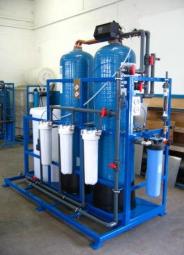 Installation of water purification system does not require large areas. For this purpose, five square meters will suffice. The best objects for the installation of this system will be supermarkets, small shops. For this purpose, you can also rent a stall. Installation is possible in other places, but they will bring less profit compared to the above. It is desirable that the objects scheduled for installation of the system were concentrated in sleeping areas. Well fit areas that are adjacent to large residential complexes. The stall should be located in areas characterized by intense pedestrian traffic.
Installation of water purification system does not require large areas. For this purpose, five square meters will suffice. The best objects for the installation of this system will be supermarkets, small shops. For this purpose, you can also rent a stall. Installation is possible in other places, but they will bring less profit compared to the above. It is desirable that the objects scheduled for installation of the system were concentrated in sleeping areas. Well fit areas that are adjacent to large residential complexes. The stall should be located in areas characterized by intense pedestrian traffic.
Entrepreneurial activity of this kind is “the business of one district”. This means that potential consumers will not travel long distances for the sole purpose of consuming your water. Therefore, it is desirable to concentrate their business activities in the outline of one district, whose residents will become your regular customers. However, after stabilization of business in one area, it is reasonable to expand its services, that is, to establish sales of clean water in other residential areas.
An important point in this business is to attract new clientele. For this purpose, you can resort to significant tests of good quality of your products. This way you will remove all doubts of potential customers. The need for such a reception is interpreted by the fact that among people there is a perception that the quality of water sold in draft points does not differ in quality from tap water after passing through the filter. It should also be verbally explained to potential customers that the filters installed at home cannot practically remove many unwanted chemical elements and their compounds from the water.
Sale of bottled water
Such a business is a more capacious and costly type of business activity. However, in this case, you will gain more customers. Bottled water among various firms, enterprises, and various production capacities is in great demand. It would be useful to arrange the delivery of such water to individuals. The constraints of this type of business include the size of start-up capital and competition. But all these barriers with a careful approach to the implementation of the business can be overcome. It is impossible to enter this market without a rented premises, appropriate equipment, car. In addition, the working staff must have a driver, an operator who is necessary to fulfill orders. All this requires a significant initial investment. It should also be remembered about a number of organizational issues: advertising, website creation, and so on.
It is interesting : read our other articles - "", "" and "".
The most common mistake in this business is dumping. Often, entrepreneurs reduce the cost of their goods in order to overturn competitors' customers. But in this case, the quality of the product (water) will also decrease in parallel. Such a practical approach to competition, as practice has shown, is not productive. Yes, it will strengthen, but to attract customers low-quality goods will not succeed. For this reason, its activity is better to focus on obtaining high-quality water. It is desirable that your water surpasses the quality of its competitors in quality. Then your brand will become widely known.
Sewage treatment
This type of business is the largest in this area. Cleaning services will be in demand among large production facilities, including state ones. That is, the authorities themselves will contribute to this direction to some extent.
Wastewater treatment will require large plants and large-scale production, whose activities are based on the use of water in the production process. In accordance with regulations and laws, these facilities should carry out mandatory measures aimed at cleaning wastewater and air. It is noteworthy that few entrepreneurs are involved in this type of business, that is, with the implementation of such an idea, you will not face tough competition. However, we note that in this area requires the availability of relevant theoretical knowledge and practical skills.
Last summer in Moscow there was no filter for drinking water. It was rumored that the terrorists were going to poison the water supply. It has passed. But water from the tap, despite all the optimism of officials, is drunk in Russia less often. Manufacturers and suppliers of bottled water are doing better. The big players, Bon Aqua (Coca – Cola), Aqua Minerale (Pepsi-Cola) and Sacred Source (Nestle), are continuing their offensive on the Russian market. In Russia today there are already more than a hundred plants for the production of drinking water, so almost in every region there is also water from local producers. “Iceberg” in Kaliningrad, “Davpon” in Syktyvkar, “Polustrovo” in St. Petersburg, “Malkinskaya” in Petropavlovsk-Kamchatsky, “Shishkin Forest” in Moscow, “Zapovedny Spring” in Samara, “Prikamye Spring” in Perm, “ Clean water "in the Novosibirsk region.
The offer is extensive. However, all the advantages of bottled water of any manufacturer covers one significant drawback - its price. That is, as a drink - perhaps, yes. But they cook on bottled water today only in the most well-to-do families. As a result, the average per capita consumption of bottled water in Russia, according to data for 2004, was only about 14 liters per year. For comparison, in Germany, Spain, France and Italy, this figure has already exceeded 100 liters per person per year for several years.
In Russia, on a permanent basis, the majority of the population is not yet able to buy bottled drinking water: the price of disposable containers makes up almost 90% of the value of the product. Many people see a panacea in household filters for cleaning, believing that it is better to pay money for the filter once and then drink free water “free”. But, alas, filters do not provide water purification to the required standards. In addition, the "free" turns out very conditional, because the filters are susceptible to contamination, and they have to be changed regularly.
After analyzing the situation, Vasiliy Zonov, an entrepreneur from Kirov, decided that it was time to offer a different option of water supply to the population.
Alternative "plumbing"
The method of providing the population of the city with clean water, invented by Vasily Zonov, is as simple as everything is ingenious. The entrepreneur found out that the basic requirements of people related to drinking water are as follows:
- guaranteed quality;
- low price;
- proximity to the consumer.
To achieve these parameters, Zonov decided to create a network of typical “Key of Health” kiosks in the city for the sale of ecologically clean artesian drinking water for bottling and to establish uninterrupted delivery of this water by road from the well to the kiosks. The sale of water was to be carried out in the buyer's container. Naturally, customers could not only bring a container (a five-liter plastic bottle), but also buy it right there at the kiosk.
With this method of selling all the basic requirements are met. High water quality was achieved by using as a source of water supply wells with environmentally friendly water, the merits of which were preserved during transportation by vehicles with special containers for the transport of food liquids. In addition, during transportation and in the kiosks it was supposed to provide the necessary thermal insulation in order to sell water with a temperature of 4–8 degrees Celsius (the natural temperature of the water from the well), this was already a matter of technique. As for the low price, it was achieved by excluding disposable containers from circulation, simplifying the procedure for obtaining water and its delivery to kiosks, and also due to the absence of the need for bottling and storing goods in warehouses.
In addition, Zonov intended to make a profit not due to the high price per unit of production, but due to the large sales volume. Finally, proximity to the consumer meant the territorial reach of the kiosks for the citizens and convenient hours of their work: clean drinking water should have been made available to almost any buyer.
Vasily Zonov outlined all these aspects in a letter to the head of the administration of the city of Kirov. He did not ask to finance his project. I asked only to allocate space for kiosks. Probably, recalling that the federal program “Providing the Russian population with potable water” had long been adopted in the country, the administration agreed to provide places for kiosks in those areas that the entrepreneur designated in a letter. It was in 2000. And today, about nine dozen of these kiosks work in Kirov, and two thirds of the people in Kirov are using delivery water for drinking and for cooking.
The difference between water from kiosks and water supply is huge! - Said the driver of the Kirov taxi. - It is only once to try the tea out of it, and it is already impossible to brew it otherwise. Even if the filter is used. We bought water there for the first time when, because of an accident, we turned it off for a whole day in our area. And then I liked it. How much do we buy? Now I count. Probably 20-25 liters per week for two with his wife. Imagine, for 100 rubles the whole month are provided with the purest water (water in Kirov costs one ruble per liter. - Approx. Ed.)! Well, we buy two empty bottles for 15 rubles once a year.
The kiosks are very nice, the stalls are neat, and the water is tasty and inexpensive. One liter of water costs only fifty rubles. Always buy this water home and especially before going to the country, as I do not trust water from the local well. The water in the kiosks is delivered from a well in the village of Shoshki, located quite far from the city. Many times she saw cars with shiny tanks on the highway, so we are sure that water is not produced in the city, it is really clean. Who is buying? Yes, almost the entire city, even retirees. I recently met on the street a grandmother with a cart, in which lay several large five-liter bottles, ”a Syktyvkar resident Yekaterina Guschina told the Business Journal.
Image - everything!
- We very carefully choose partners. I would not like to work with those who seek enrichment at any cost. This business already pays off in record time - from 8 to 13 months. It is important that the person does not disgrace the very idea of \u200b\u200bthis business, since it excludes any falsification. After all, if the company starts selling water from the tap under the guise of natural - it will instantly become clear to buyers, and it will be impossible to regain their trust. We need a solvent and value partner. Ideally, an entrepreneur in his city, for whom this is not the first business, says Vasiliy Zonov.
Zonov asks to evaluate the following resources for the "selection" of businessmen from other cities who wish to become partners of the company "Key Health" and open a similar network of drinking water kiosks:
- own and / or borrowed finances;
- the ability to "resolve the issue" with the city authorities on the allocation of seats under the kiosks;
- is there really bad water in the city's water supply;
- availability of wells with water that meets the highest quality standards.
It is necessary to “drive in” this business on a large scale, and you will have to invest a lot right away. You can not put one kiosk, then save money for the second and collect the third, says Zonov. - In our experience, we recommend starting at least one kiosk for 15 thousand inhabitants. That is, to open such a business, for example, in a half-million city you need 450-500 thousand dollars.
In addition, it is very difficult, as practice has shown, to resolve the issue with the city administration. “What to hide, problems with officials are problems of any business. Therefore, despite the fact that this is a socially significant project, before signing the contract, we recommend finding out whether the administration of your city will give space for kiosks, ”advises Vasily Zonov.
Convince the administration in each city will have their own way. Someone will give bribes, in the absence of any other way out, and someone can be helped simply by referring to the already mentioned Program “Providing the Russian population with drinking water” and a detailed explanation of the social significance of the project. After all, everyone understands that in the near future, safe cleaning of tap water by ozonation or UV irradiation in our country will not be applied. Stainless pipes will be needed, and this will require a complete replacement of water pipelines, which is obviously far from the “near future”. Now, in the majority of Russian settlements, barbaric chlorination technology is used, which in this form has long died all over the world, because chlorinated water provokes a high incidence, including oncological diseases. Having explained all these problems in a letter to the head of the administration, Vasily Zonov, for example, found the support of the authorities. In addition, the Free Health Key Advertising Campaign was organized.
This business necessarily involves massive advertising in all media, which should precede the appearance of kiosks in the city. People need to be taught to the new, to what they have never had. The essence of all materials in the media should be reduced to one thing - finally, thank you, Lord, there will be an alternative to the city water supply system, the quality of which is beyond any criticism. And the water in the faucet really smells of chlorine, has an unpleasant taste, color or smell. Or all together. Water analyzes made by SES also leave much to be desired. In general, poor water quality should be a well-known urban fact that is no longer required to be proved, but which is exactly what needs to be talked about. The task of an advertising campaign is to stimulate demand. People need to be sure that the water in the water supply is bad, and in the kiosks it is good and controlled by the SES, says Zonov.
Following - wells. Drilling and equipment of one well can cost much more than a million rubles and will require a lot of time for bureaucratic procedures associated with its registration and launch. Yes, and "drill" immediately good water is impossible. But it’s completely unnecessary to drill your own well, since it is possible to find an acceptable one in the vicinity of almost any city. It is necessary to begin searches with the Hydrogeological Committee and SES, which are also in each city. It should request data on all wells in a radius of approximately 30 kilometers from the city center. Then it becomes less profitable to carry water. From the wells found, it is necessary to choose one or two, with the best water available in this area, and ideally the highest category of drinking quality. According to the documents, it must comply with SanPiN 2.1.4.1116–02 “Drinking water. Hygienic requirements for the quality of water packaged in containers. Quality control". If there are no wells with such water, then surely there will be one that can be cleaned to the required parameters. True, it must be remembered that filtering increases the cost of water, and the certificate will not contain the word “natural”.
Having found a suitable well (and here hydrogeologists and SES should help), it is necessary to buy it out or sign a lease agreement. In fact, outside the city, many wells are generally closed or supply water to a couple of houses or some pigsty. The owners are happy to sell or rent them, provided that the tenant takes all the trouble to provide the pigsty with water. In general, there are usually no problems with a well. For example, over 30,000 wells were found within a radius of 30 km from the city of Kirov. Of these, four were selected with the best natural water that does not require any treatment. And already from these four one was chosen taking into account other considerations and requirements. The beauty and ecology of the area played a significant role.
Why am I a water carrier
For those who have carried out a similar assessment of all resources in their city and received positive answers on all counts, the Zon entrepreneur proposes to buy a kind of “franchise in Russian”. This is a package of documents that contain the scheme of work, recommendations, computer programs, forms of necessary documents and promotional materials. The cost of the package is $ 35 per thousand population of the city, but not less than $ 10,000.
In the future, we closely cooperate with partners, participate in the project launch, train specialists, provide both consulting and practical assistance, Zonov says. - Our experts can go to that city to solve any problems that arise. In general, we support as much as necessary. As for geographical policy, the principle is as follows: one city - one partner.
For those who do not want to buy “paper”, Vasily Zonov suggests simply purchasing brand-name kiosks (which also buy full-fledged franchisees) at prices ranging from 163 to 175 thousand rubles, depending on the volume of the order.
Forge kiosks while there were no willing, because they are patented, - says Zonov. - The patent is quite wide, almost any kiosk, regardless of color and shape, has a water tank on top and a kiosk space below. Find someone who will make it cheaper for you - for God's sake! But in the manufacture of the kiosk uses a lot of food grade stainless steel, and it is expensive. In addition, we have a streamlined and optimized production. Kiosks "run-in", they provide and take into account everything. Even prefabricated foundation forms with a porch and railings are supplied, as well as kiosk mounting accessories. Therefore, to find someone who will produce a similar kiosk cheaper is almost impossible.
Despite the fact that the “Key of Health” has been selling water for more than three years, sales are still growing every month. No wonder. Man is 80% water. And many no longer care from which, actually ...
"Water" business in detail
- Main advantages. The project can be presented as social within the framework of the Federal Program “Providing the Population of Russia with Drinking Water”, which makes it possible to support (possibly even material) from the city administration.
- Investments. About 450-500 thousand dollars to start a business in a half-million city.
- Format. A network of branded kiosks of the same type at the rate of at least one kiosk for 15 thousand people at the start of the project, up to one kiosk for 3.5 thousand people while the market is saturated.
- Payback period. Very short (8–13 months).
- Certificates and licenses. It is necessary to be ready to interact with GorSanepidnadzor, which will regularly check both the quality of water and the entire chain of delivery from the well to the consumer. On the water from the well you need to get a certificate of Gosstandart of Russia.
- Audience and prices. The entire population of the city, including the elderly and infants, the poor and the rich. The cost of one liter of water is 1–1.5 rubles, an empty plastic bottle with a capacity of five liters is 15 rubles.
- Means of promotion. A powerful advertising campaign in all city media, anticipating the appearance of kiosks, “likbezovskie” leaflets and brochures issued by the kiosk to all buyers.
- Staff. An ideal kiosk is a benevolent, cheerful retiree, a former doctor or teacher.
- Competition. Virtually absent. Bottled water does not compare with the prices of "bottling" and has a slightly different market.
The market of clean drinking water is considered promising, the demand for it is constantly growing. Vending machines claim a significant share of this niche, as they reduce the cost price of a liter by 4 times.
Vending machine for the sale and purification of water has all the chances to make a serious competition to its sales in bottles, and home delivery companies. According to market research data, every 10th supermarket buyer in the winter and every 5th in the summer acquire pure drinking water. The cheaper it is, and the easier it is to make a purchase, the better for the consumer. Entrepreneurs are interested in the low threshold for entering a business - up to 150,000 rubles.
Market Overview
Sales of bottled water in Russia are increasing, although the volume of this market is much smaller than in developed European countries. Thus, according to the marketing research of the company Nielsen, in 2014 sales increased by 6%, drinking water accounting for 36%. It is produced by more than 200 domestic enterprises, 76% of them are concentrated in the Central part and the North Caucasus region (Fig. 1).
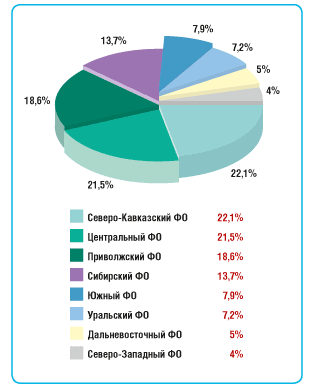
The cost of a 1.5 liter bottle in the middle price category is 30 - 40 rubles, in the economy class segment - up to 30 rubles. The share of expensive imported products occupies only 10% of the niche. This is a very attractive market for investors: production is cheap, the risks are low, the premium is high. The demand for products is growing - people are afraid of the consequences of tap water, most of the engineering networks have been in use since the days of the Soviet Union.
The apparatus for the sale of purified water is already part of Russian life, and it is clear that this trade direction has good prospects. First of all, because the price is much lower - up to 5 rubles per liter, and you don’t need to go far - you can put it anywhere.
Automatic vs bottle
Stores rarely sell water in packs larger than 5 liters. Buying 1.5 liter bottles is inconvenient, and it comes out expensive. After all, it is used not only for drinking, but also for cooking - which, by the way, is being practiced more often. Therefore, services for the delivery of 19 liter bottles to your home is a fairly profitable business. However, the water treatment machine is even more convenient for buyers, because they do not need to place an order in advance, wait for delivery at a set time, store empty containers for exchange. For the entrepreneur - it is doubly beneficial. Organization and maintenance of transport service , staff dispatchers, movers is expensive.
The main thing to remember: the income of the vending machine is directly dependent on the location. Where they are usually installed:
- in the courtyards, in the center of the residential block for 3 - 5 houses;
- at the points of the "exit" from the highway to the sleeping area;
- in places of mass passage from the stops to the residential area;
- in actively visited stores, pharmacies, in the markets.
Installed on the street devices require anti-vandal protection, it is better if they are located under a canopy, the roof of the kiosk. The most promising place for accommodation is new buildings in residential areas, for several reasons at once.
- in homes of improved planning there are large halls, landings, places for equipment, information;
- in new areas, there are usually not enough stores, no supermarkets, they are removed from the center - delivery there is expensive;
- the tenants of such houses are usually active young and middle-aged people - they easily get used to the novelties, value time, watch the food;
- for buyers it is very convenient - they do not depend on time, at any time of the day or night you can buy the required amount of water without leaving your home.
- homeowners associations (CCs) are always being created in the occupied houses - it is easy to come to an agreement with them, they are interested in income from renting space.
At first glance, a product like water does not require advertising. And yet, some number of bright booklets, flyers in doorways, mailboxes - will certainly benefit. Quality is another matter. Next to the machine, it is advisable to hang an explanatory banner on which the entire cleaning plan is detailed and beautifully reflected. It will attract attention, arouse curiosity and a desire to try. Affordable price, ease of maintenance, cleanliness and taste of the water will complete the job - get used to the good quickly. To increase customer confidence, it is advisable to specify a schedule (schedule) for filter replacement.
According to the Civil Code (part 2, article 498), mandatory information should be placed near the trade equipment. It includes: specifying the details of the seller, its location, telephone for communication, mode of operation. In addition, there should be an instruction on the rules for using the device, the procedure for payment, and claims.
View, device and service
How does the water treatment machine, and what is required for its maintenance? Consider the principle of operation on the example of the Russian model “Aquatic WA-400Y” (Fig. 1). It is very compact in size: only 0.7 × 0.8 m, and a height of 1.85 m. At the same time it holds a tank with a volume of 100 liters, and produces 1,700 of pure water per day. Work requires only connection to the standard power supply of 220 W, and to the water supply. Released by "VendShop" specializing in the production of vending machines for almost all types of trade (one of the most popular selling carbonated drinks).
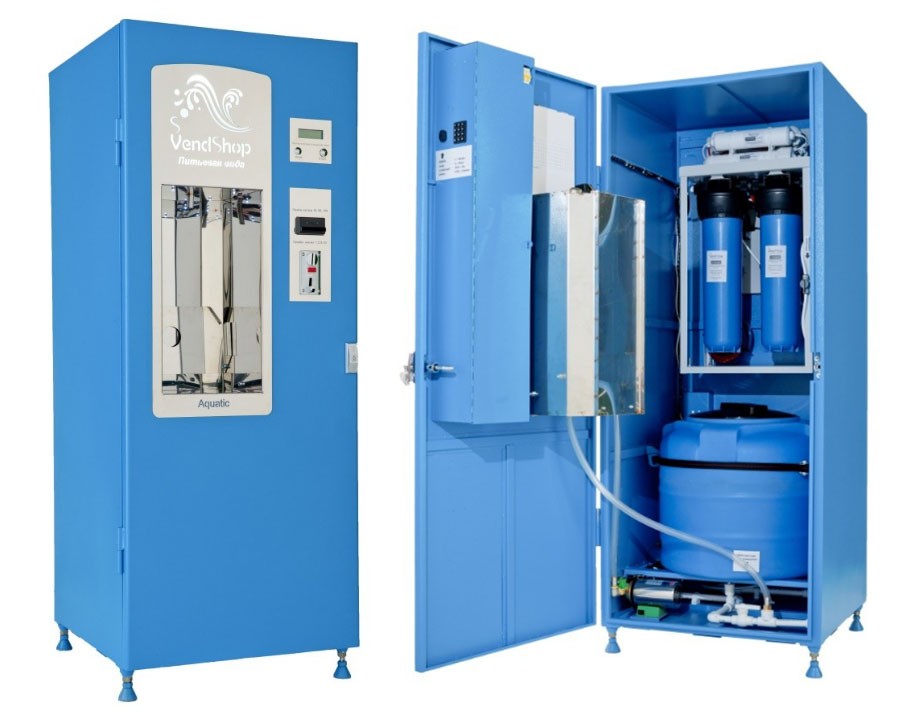
The filtration system includes 8 degrees of purification. It is based on the reverse osmosis principle: water under pressure passes successively through special membranes that release it from mineral impurities, salts, rust, and enters the storage tank. With the help of a pump, it is fed into a niche for distribution, which is designed to use containers of any size: from a glass to a 19-liter bottle. During processing, harmful substances are removed from it: nitrites, cadmium, mercury, chlorine, extraneous odors are neutralized (Fig. 3).
Maintenance is minimal: in fact it comes down to regular replacement of filters. Vending machines of the new generation are equipped with modern banknotes and coin acceptors, GSM technology makes it easier to control the work. With the help of programmable functions, you can remotely obtain information about the triggering of sensors (clogging, impact), the need to collect, lock the machine, analyze sales statistics. If additionally use for accounting and bookkeeping modern "cloud technology", then you can control the business with minimal time.
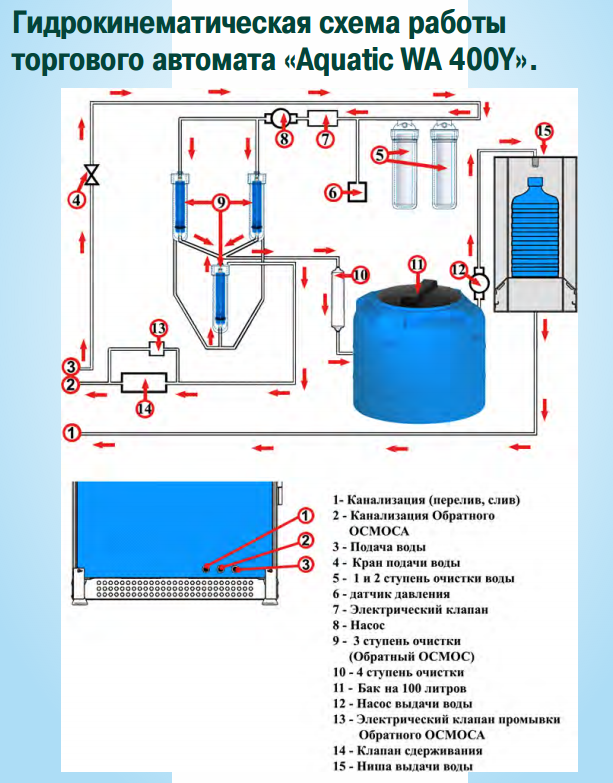
Get acquainted with the technical characteristics automat.
Approximate investment calculation
Calculate the volume of investments in the business of drinking water, and the payback period of the equipment (tab. 1). For example, the cost of the Aquatic WA-400Y machine discussed above is 148,900 rubles. Baseline data for an example:
- according to statistics, the average family of 3 people buys about 270 liters of water per month - 9 l / d;
- approximately 10 families use the services of a single unit daily - 270 l / d;
- tariff for cold water in the region - 19 rubles / m 3; selling price of 1 l - 5 rubles.
- The cost of 1 l: 81 557/98 550 \u003d 0.83 rubles., Which is more than 5 times lower than the selling price.
- Revenue for the year: 98,550 × 5 \u003d 492,750 rubles.
- Profit before tax: 411 193 rubles.
It turns out that one water dispenser pays for itself within 4 to 5 months.
A suitable type of activity is “Retail trade outside stores”, for example, OKVED - 47.99. If a register as ip then you can apply USN or UTII (if allowed by local law).
Perspectives of business on the periphery
Market analysts estimate that about 165,000 vending machines have been installed in Russia, and by 2020 they predict a doubling of their number. Most of them are concentrated in Moscow and St. Petersburg (Fig. 4). According to the “Allbiz” (electronic) trading platform for the first 4 months of 2016, sales volume reached a semiannual level of last year. At the same time, the number of buyers from regions: Krasnoyarsk Krai, Yekaterinburg, and Kirov Region is growing.
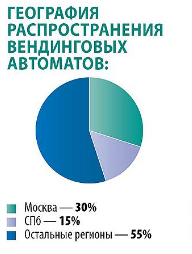
In medium and large cities, this niche is almost free. Marketers believe that for a city with a population of 500 thousand people - the market capacity is about 250 machines of the same type. In places of developed tourism the figure may be higher. Given the relatively low cost of equipment, the complexity of doing business can be considered a vending business as quite promising for development in small cities . In addition, many manufacturers sell equipment in installments.
In connection with the current environmental situation, the problem of high-quality drinking water becomes quite acute. In particular, it is relevant in large cities. Drinking tap water is not recommended today, because it not only has an unpleasant taste, but may also contain various substances that are hazardous to health. In this regard, the population demonstrates a high demand for the purchase of bottled drinking water. Despite the fact that there are many companies that meet the similar needs of consumers, to take their place in this niche is quite real. We will talk about how to organize a business for the sale of water today.
Organizational moments and business perspective
To start the production of drinking water, it is necessary to draw up a detailed business plan that takes into account all the main stages of opening and running a business.
As for the prospects of this event, they can, without exaggeration, be called colossal. This is due to the fact that, according to research, today drinking water for the cooler consumes at least 30% of the population of our country. Every year this percentage only increases. Accordingly, the business of selling water will be very relevant for many years.
Source for production
First of all, you need to decide where you will take the water for its further processing. Sources can be both specially equipped wells, as well as lakes, rivers and other water bodies, as well as ordinary water supply.
The cheapest option, of course, is to use water from the tap. If you decide to drill a well, then this venture will cost you a very significant amount, but the extracted water may have unique qualities that will bring significant results in the future.
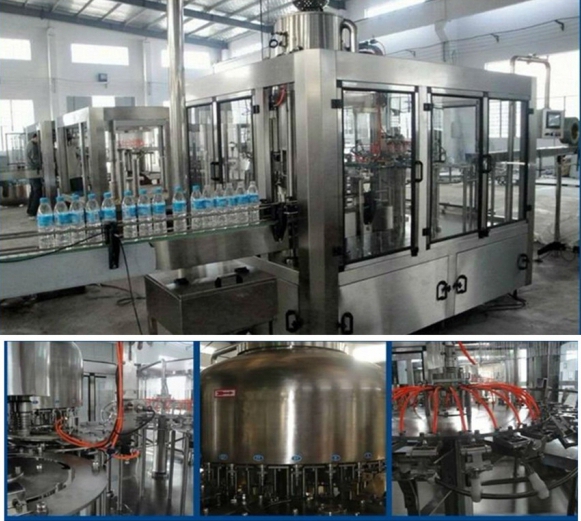
Company registration
Due to the fact that most of the sales of finished products will fall on legal entities, it is best to register your business not as an individual entrepreneurship, but as a legal entity (LLP or LLC).
Getting permissions
Regardless of the water source, it is necessary to analyze it in a specialized laboratory for the presence of hazardous substances. The Sanitary and Epidemiological Station should also inspect your production area and find out whether it meets state standards. With these findings in hand, you can proceed to obtaining a production license. After you have acquired this document, really start a business.
Equipment for the production of drinking water
This item of business organization is the most expensive. Thus, the water production line should include the following equipment:
- pumping and cleaning equipment, the cost of which starts from 3.5-5 thousand dollars;
- line for bottling water worth about 4 thousand dollars.
If you plan to use fully automated equipment, its price will be higher - from 20 thousand dollars.
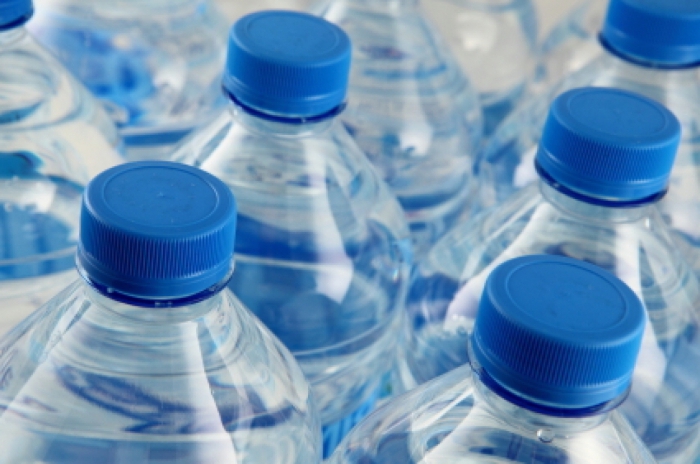
For a start, you can buy ready-made plastic bottles for bottling the finished product. However, in the future, for
When purchasing all units, be sure to pay attention to their performance, quality and conditions of warranty service. Do not forget that the quality of the final product depends on the equipment, respectively, and the success of your business.business optimization, it is desirable to acquire its own line for their production. Such equipment will cost from 12 to 15 thousand dollars.
Water production technology
Water for the cooler is the result of a rather complicated technological process and is produced in several stages.
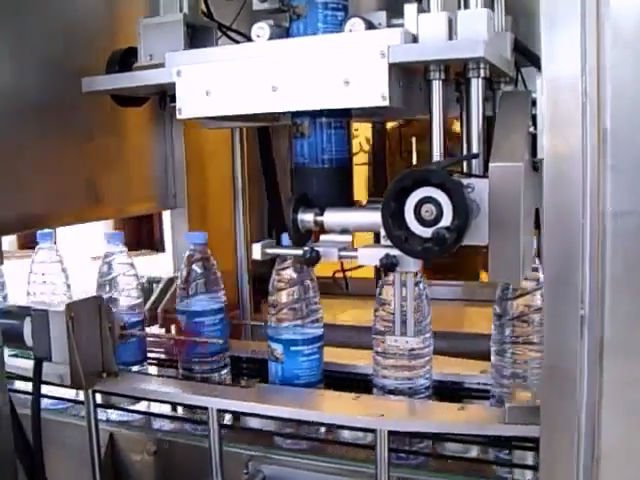
Production room
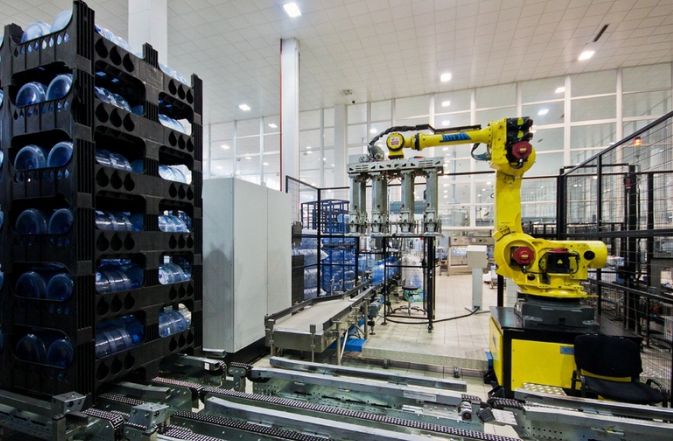
Due to the fact that water for the cooler is a food product, quite serious requirements are imposed on the production workshop. Thus, the premises should include several separate zones: the extraction of raw materials, their cleaning and bottling the finished product. In addition, there must be office space for your employees and warehouses for products. Therefore, you will need to thoroughly prepare and take care of many details before you can start this business.
Water for bottling: the financial side of things
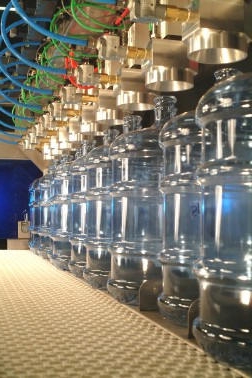
When organizing this business, it should be borne in mind that such a product has a pronounced seasonality of consumption. Thus, the peak sales of drinking water fall in the period from May to August. Accordingly, at the same time, the entrepreneur can count on the greatest profit from its production.
As for profitability, then, according to experts, the gross profitability of such a business can reach 700%, which is
very high rate. The payback period of all initial investments directly depends on the businessman’s sales markets, methods used to clean the raw materials, as well as various equipment characteristics. On average, this period ranges from two to three years.
Ways to sell finished products
We have dealt with the process of organizing production. Now it's time to go to the question of how to sell water. After all, it is not enough to organize a mini-plant, you also need to think over the options for selling products to the final consumer.
There are two ways to sell ready-made drinking water: using your own delivery service or through other companies with an already established sales system for these products.
The first option is quite complicated, as it requires careful study of the plan for the delivery of products. In addition, you will need to organize your own fleet of vehicles consisting of at least 5-7 suitable vehicles, as well as develop a marketing strategy to promote your products, including the creation of a brand.
If you decide to sell your product through other companies, you will automatically become a wholesale seller. In this case, it is not necessary for you to develop your own trademark, as you can use the brand of the partner company.
Important details of the drinking water production and distribution business
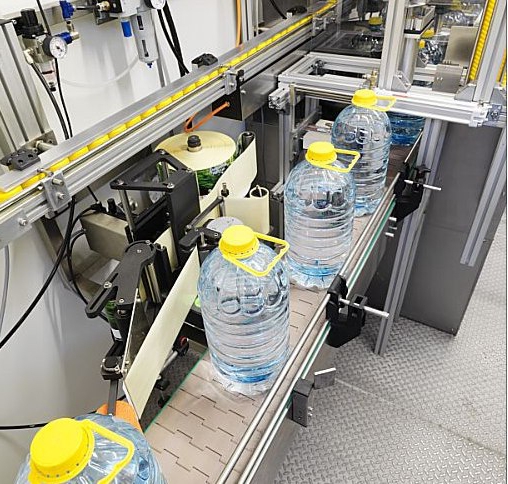
The main focus when organizing such a business is to be paid to the quality of both finished products and services. Therefore, when buying equipment, it is desirable to prefer foreign ones to domestic units, even if they were used.
In addition, customer service should be at the highest level. After all, the consumer can very easily prefer you to a competitor who has a better water delivery organization than you do. Return the same lost client is almost impossible.
Also, in order to achieve an excellent result, it is necessary to constantly study the competitive environment and try to offer the consumer more. So, today, many manufacturers provide customers with the free use of coolers. Therefore, if you do not do this, then your client base will expand rather slowly.
Additional means of earning income
In addition to the production and sale of bottled product, it is easy to organize a business on machines for the sale of drinking water. Today, they can be increasingly found in the cities of our country. It is advisable to install automatic devices in high-traffic stores located in residential areas. Earnings from each such machine can reach $ 500 per month, and its payback period is about 12 months.


